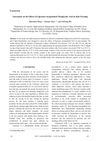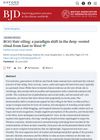 April 2024 in “Research Square (Research Square)”
April 2024 in “Research Square (Research Square)” 16-MHA can restore the barrier and moisture of damaged hair, making it similar to undamaged hair.

Some plant-based ingredients may help with hair growth and care, but more research is needed to confirm their effectiveness.
 87 citations,
March 2011 in “Australasian Journal of Dermatology”
87 citations,
March 2011 in “Australasian Journal of Dermatology” Genetics and hormones play a role in male and female hair loss, but more research is needed to fully understand it.
 17 citations,
May 2010 in “Journal of Dermatological Science”
17 citations,
May 2010 in “Journal of Dermatological Science” Erythropoietin helps hair grow and could be a potential treatment for hair loss.
 5 citations,
January 2020 in “Skin Research and Technology”
5 citations,
January 2020 in “Skin Research and Technology” Minoxidil 5% works better than 2% for hair growth in male-patterned hair loss.
 2 citations,
October 2015 in “Primary Care: Clinics in Office Practice”
2 citations,
October 2015 in “Primary Care: Clinics in Office Practice” Doctors should diagnose hair loss by examining the patient and possibly doing tests, and then treat it based on the type, which may prevent permanent hair loss.
 January 2024 in “Deleted Journal”
January 2024 in “Deleted Journal” Essential oils may help hair health but lack strong scientific proof and can cause allergic reactions.
 June 2023 in “International journal of pharmaceutical quality assurance”
June 2023 in “International journal of pharmaceutical quality assurance” Eclipta alba extract could be a promising natural treatment for hair loss.
 November 2020 in “Acta Scientific Women's Health”
November 2020 in “Acta Scientific Women's Health” Low vitamin D levels can significantly contribute to hair loss, especially in women aged 35-45. Correcting these levels early may help prevent and treat this condition.
 1 citations,
April 2016 in “Journal of The American Academy of Dermatology”
1 citations,
April 2016 in “Journal of The American Academy of Dermatology” People with allergies or high eosinophil levels have a higher chance of severe hair loss from alopecia areata, and sudden hair loss can indicate chronic graft-versus-host disease.
 January 2014 in “Sen i Gakkaishi”
January 2014 in “Sen i Gakkaishi” Liposome-encapsulated thioglycolic acid improves hair perming effectiveness and durability.
 April 2019 in “Journal of Investigative Dermatology”
April 2019 in “Journal of Investigative Dermatology” Differences in growth factors in platelet-rich plasma therapy for hair loss can vary between patients and can be influenced by the devices used, possibly leading to inconsistent results.
 1 citations,
September 2022 in “Journal of the American Academy of Dermatology”
1 citations,
September 2022 in “Journal of the American Academy of Dermatology” Exosome therapy shows promise for hair growth but needs human trials for validation.
16 citations,
March 2021 in “Frontiers in cell and developmental biology” A new method using Y-27632 improves the growth and quality of human hair follicle stem cells for tissue engineering and therapy.
11 citations,
January 2018 in “Springer eBooks” The book helps surgeons improve hair transplants for Asian patients.
3 citations,
December 2021 in “Skin research and technology” Higher hair luminosity and shine mean higher perceived transparency.
24 citations,
June 2018 in “PubMed” Serenoa repens extract helps regrow hair and repair hair loss by activating certain cell growth pathways.
 11 citations,
May 2021 in “Dermatologic clinics”
11 citations,
May 2021 in “Dermatologic clinics” PRP and cell therapies may help with hair loss, but more research is needed.
 7 citations,
September 1987 in “PubMed”
7 citations,
September 1987 in “PubMed” Most hair loss cases are caused by four main conditions, and understanding them is key to treatment.
3 citations,
January 2020 in “Springer eBooks” The book guides surgeons on effective hair restoration techniques, including PRP, to achieve the best results.
 2 citations,
July 2022 in “PubMed”
2 citations,
July 2022 in “PubMed” Coconut oil helps with brittle hair and infestations, castor oil may improve hair shine, and argan oil lacks evidence for hair benefits.
2 citations,
January 2016 in “Springer briefs in molecular science” Using natural sources as hair conditioners can help restore shine and softness to damaged hair.
 June 2024 in “British Journal of Dermatology”
June 2024 in “British Journal of Dermatology” Hair oiling has become popular in the West due to globalization and social media.

UC-MSC-derived exosomes may help treat hair loss by promoting hair cell growth through AKT activation.
 April 2021 in “Journal of Investigative Dermatology”
April 2021 in “Journal of Investigative Dermatology” The research found genes that may protect certain scalp cells from hair loss.
 May 2024 in “Anais brasileiros de dermatologia/Anais Brasileiros de Dermatologia”
May 2024 in “Anais brasileiros de dermatologia/Anais Brasileiros de Dermatologia” Oral minoxidil 7.5 mg for hair loss increases heart rate but not blood pressure.
February 2023 in “PLOS ONE” Caizhixuan hair tonic helps treat hair loss by promoting hair growth and improving hair follicles.
 January 2022 in “Biomedical Reports”
January 2022 in “Biomedical Reports” Inaudible sound at 30 kHz can boost hair growth and decrease hair loss by promoting cell growth and reducing cell death in hair follicles.
 January 2016 in “Faculty Opinions – Post-Publication Peer Review of the Biomedical Literature”
January 2016 in “Faculty Opinions – Post-Publication Peer Review of the Biomedical Literature” A substance called prostaglandin D2 is found more in bald scalps and it stops hair from growing. Blocking its receptor could potentially treat hair loss.
 May 2012 in “Faculty Opinions – Post-Publication Peer Review of the Biomedical Literature”
May 2012 in “Faculty Opinions – Post-Publication Peer Review of the Biomedical Literature” Prostaglandin D2, found in higher levels in bald scalps, stops hair growth, suggesting that blocking its receptor could potentially treat hair loss.























